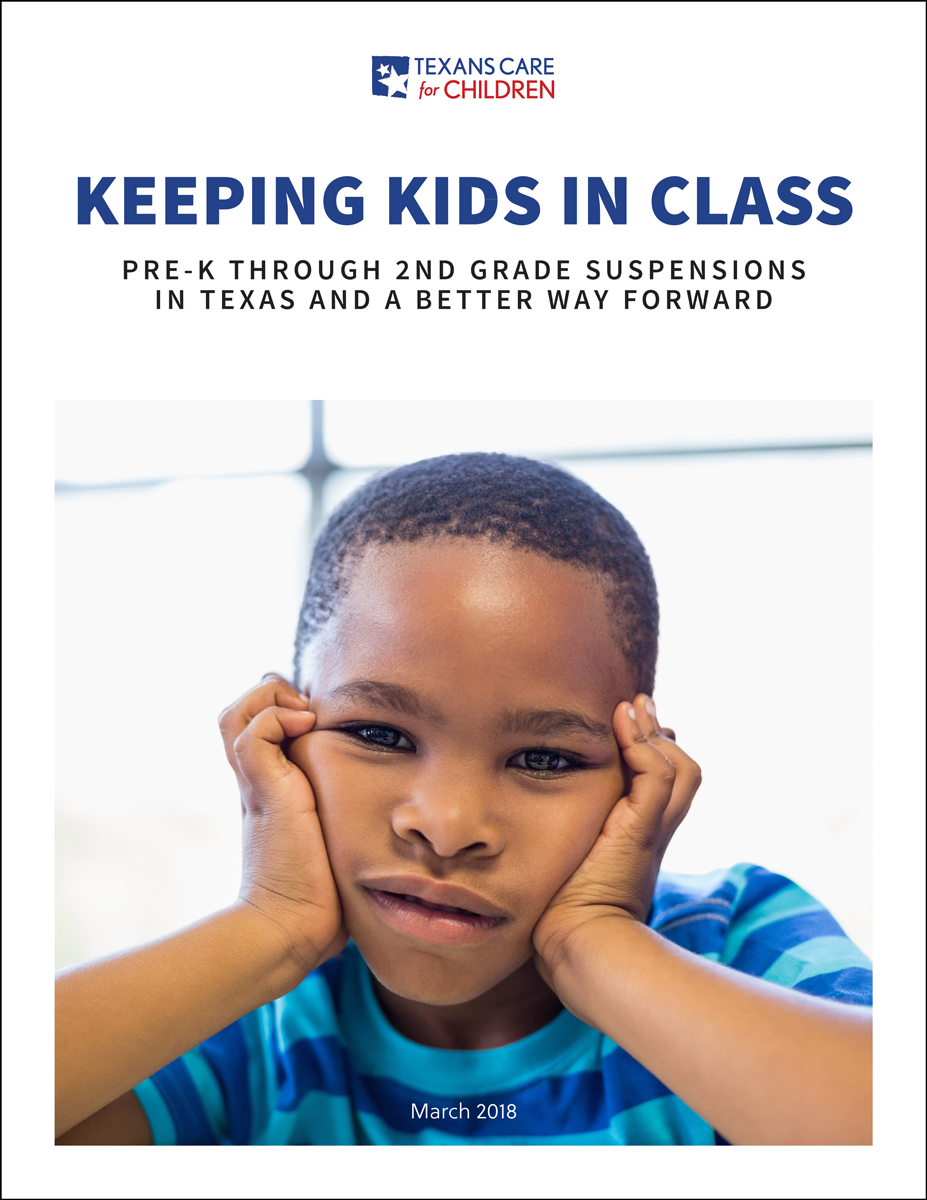With In-School Suspensions Still Permitted, Concerns Include High Suspension Rates in Certain Districts and for Certain Groups of Students

Austin – A new report released today by the nonprofit organization Texans Care for Children warns that Texas students in pre-k through second grade are still at risk of being suspended. The report calls on education and policy leaders to work to replace early grade suspensions with positive behavioral strategies, reduce the use of in-school suspensions in these grades, eliminate the disproportionate punishment of certain young students, and rein in those districts that suspend shockingly high numbers of pre-k students.
Texans Care for Children is presenting the report to the Texas Senate Committee on Education as it holds a hearing today on classroom conduct, teacher support, and school discipline.
The report follows up on the state Legislature’s passage of HB 674 in 2017 to ban out-of-school suspensions in nearly all cases for pre-k through second grade students. The legislation allows school districts to continue to use in-school suspensions for those grades. The bill also authorized districts to implement positive behavior strategies and supports for students and teachers.
“The Legislature took a huge step forward last year, but there’s more work to do for school boards, superintendents, and state leaders,” said Stephanie Rubin, CEO of Texans Care for Children. “School leaders need to make sure teachers get the support they need to effectively address challenging behavior in the classroom and young students get the support they need to succeed in school.”
According to Texans Care for Children’s analysis of state data, in pre-k through second grade there were 64,773 in-school suspensions and 36,475 out-of-school suspensions in Texas public schools during the 2015-2016 school year.
“Schools are suspending little kids as young as four years old, many of whom are in a classroom for the first time in their lives. Suspending our youngest students interrupts their education, communicates to them that they don’t belong, and misses a critical opportunity to actually address why they might be acting out,” said Ms. Rubin. “A suspension does nothing to resolve the root of the problem, whether it’s a child’s developmental delay, the trauma of an abusive home, challenging but age-appropriate behavior, a teacher’s need for stronger classroom management strategies, large pre-k class sizes, or an educator’s implicit biases about certain demographic groups.”
State data indicate that Texas schools disproportionately suspend pre-k through second grade students who are Black, male, in special education, or in foster care. The report notes that that pattern likely reflects recent research led by Dr. Walter S. Gilliam of the Yale Child Study Center. In a controlled study in which young Black and White children were actors and behaving appropriately, both Black and White early educators were more likely to focus on boys, particularly boys who are Black, as potentially misbehaving.
In the 2015-2016 school year, compared to White students, Black students in these grades in Texas were almost five times more likely to receive an out-of-school suspension and more than twice as likely to receive an in-school suspension. Boys were more than four times more likely to be suspended — either in-school or out-of-school — than girls. Students in special education were two times more likely to receive in-school and out-of-school suspensions than the overall pre-k through 2nd grade student population.
Schools also disproportionately suspended students in foster care, with their rates of in-school suspension exceeding the rate for students in special education, boys, or any racial/ethnic categories. Shockingly, there were over 21 suspensions per 100 students in foster care in kindergarten through 2nd grade (the rate is just slightly lower when including pre-k). Students in foster care were nearly three times more likely to receive out-of-school and in-school suspension than the overall pre-k through 2nd grade student population.
The report also examined district-level suspensions for pre-k, which are the most concerning suspensions considering that the students are only four or five years old and pre-k is intended to prepare them for success in school.
The report identifies several school districts throughout the state with high rates of pre-k suspensions, most notably Jasper ISD and Killeen ISD. Out of a pre-k enrollment of just 122 students, Jasper ISD issued a stunning 71 in-school suspensions to 23 students and 9 out-of-school suspensions to 5 students. Killeen ISD’s 1,460 total pre-k suspensions in 2015-2016 account for 31 percent of the 4,691 pre-k suspensions statewide, yet the district accounted for just 1.6 percent of the total statewide pre-k enrollment. Killeen ISD combines one of the highest pre-k suspension rates in the state (43 per 100 students) with one of the largest pre-k enrollments in the state (3,423 students in 2015-2016).
The report includes a number of recommendations. It urges state and school leaders to monitor and reduce the use of in-school suspensions among pre-k through second grade students, monitor and reduce the disproportionate use of suspensions on certain groups of students, and ensure that Jasper ISD, Killeen ISD, and other outlier school districts reduce their heavy reliance on early grade suspensions.
The report also recommends that schools implement – and state leaders support – effective campus and classroom strategies and models for supporting students and teachers, including Positive Behavioral Interventions and Supports (PBIS); Social Emotional Learning (SEL); Restorative Discipline; educator access to coaches, early childhood mental health consultants, and behavior specialists; maximizing the use of school counselors; referral to outside services; on-site school mental health services; and training and technical assistance offered by Educational Service Centers.
Additionally, the report addresses the need for reducing suspensions and implementing effective behavior strategies in private child care and addressing other state policies, such as support for Early Childhood Intervention, that affect early grade suspensions.
###



